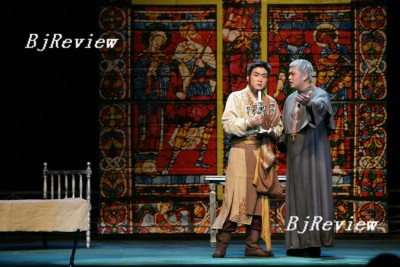
At first glance, the idea of marrying Victor Hugo's famous story of crime, love and revolution in early 19th century France, with the deeply traditional style of China's Peking Opera seemed a bit far-fetched, even for the most creative minds.
But what began as a challenge emerged as a triumph for modern theatre when Chinese audiences recently had their first live introduction to Les Miserables, one of the longest-running shows in Broadway history, albeit in a slightly different guise.
Chinese theatre-goers were already familiar with the movie and TV versions of Les Miserables and had heard much about the Broadway musical.
Yet despite its popularity the cast had doubts about the feasibility of combining basic performance skills of Peking Opera-singing, recitation, acting and acrobatic combat-with the plot of a European story.
Before the show opened, many Peking Opera amateur and professional performers questioned whether it could still qualify as Peking Opera, since the costumes, make-up and story line were set in a social background dramatically different from those traditionally used.
The full cast and crew of the locally produced Les Miserables are professors and students of the National Academy of Chinese Theatre Arts, the country's top drama and folk opera college.
With the mountain of pressure on the team to prove that they could pull off this cultural musical fusion, it was some relief to have the play fully subsidized.
Despite knowing that not showing a profit wouldn't shut the doors, all involved were anxious to see a full house each night.
When the curtain went up on Peking Opera Les Miserables, everyone held their breath.
Doubts dispelled
Actually, Peking Opera Les Miserables is not the first time a Chinese folk opera has been combined with a foreign classic. Nightingale, the famous fairy tale by the renowned Danish writer Hans Christian Anderson, was reworked into a Peking Opera format and staged in China and Germany in 2005. However, few of these attempts really succeeded. The reason is that the rewritten script in Chinese could neither capture the essence of the original work nor display the charm of traditional opera. Many people believe such a union would not cater for the Chinese youth, who loathe the slow tempo of folk operas, or foreigners, who couldn't relate the show to the well-known novel.
|